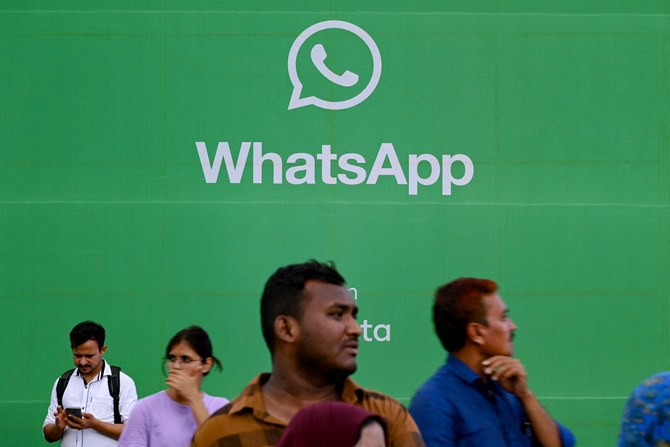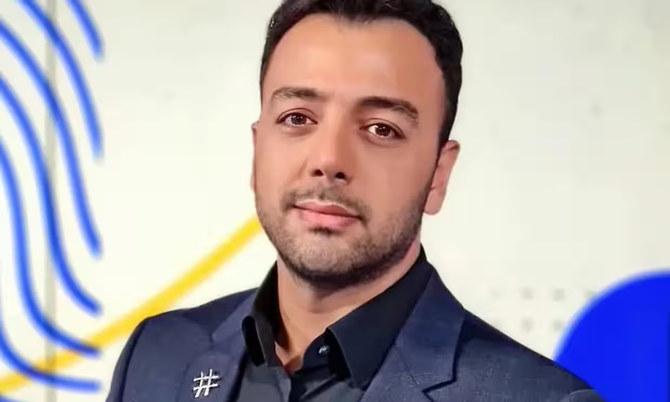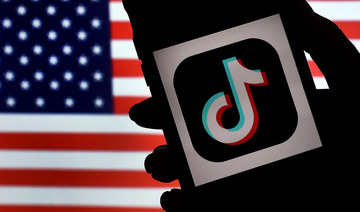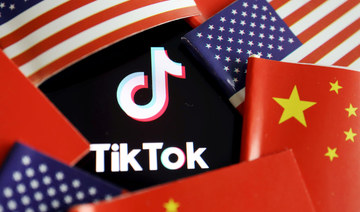NEW YORK: President Donald Trump said Saturday he’s given his “blessing” to a proposed deal that would see the popular video-sharing app TikTok partner with Oracle and Walmart and form a US company.
Trump has targeted Chinese-owned TikTok for national security and data privacy concerns in the latest flashpoint in the rising tensions between Washington and Beijing. The president’s support for a deal comes just a day after the Commerce Department announced restrictions that if put in place could eventually make it nearly impossible for TikTok’s legions of younger fans to use the app.
Trump said if completed the deal would create a new company likely to be based in Texas.
“I have given the deal my blessing,” he said. “If they get it done, that’s great. If they don’t, that’s OK too.”
Trump said the new company will be hiring at least 25,000 people and making a $5 billion contribution to a fund dedicated to education for Americans. “That’s their contribution that I’ve been asking for,” he said.
TikTok said Oracle and Walmart could acquire up to a cumulative 20% stake in the new company in a financing round to be held before an initial public offering of stock, which Walmart said could happen within the next year. Oracle’s stake would be 12.5%, and Walmart’s would be 7.5%, the companies said in separate statements.
The deal will make Oracle responsible for hosting all TikTok’s US user data and securing computer systems to ensure US national security requirements are satisfied. Walmart said it will provide its ecommerce, fulfillment, payments and other services to the new company.
“We are pleased that the proposal by TikTok, Oracle, and Walmart will resolve the security concerns of the US administration and settle questions around TikTok’s future in the US,” TikTok said in a statement.
Trump has been demanding that the US operations of TikTok be sold to a US company or else be shut down. He’s also been targeting WeChat, another Chinese-owned app.
The administration contends that the user data collected by the two apps could be shared with the Chinese government. On Saturday, Trump said the US-based TikTok “will have nothing to do with China.” TikTok says it has 100 million US users.
On Friday, the US Commerce Department said it would bar TikTok from US app stores as of late Sunday. Further restrictions that would prevent TikTok from accessing essential Internet services in the country would go into effect on Nov. 12. Commerce said Saturday that it will delay the barring of TikTok from US app stores until Sept. 27 at 11:59 p.m.
Commerce is imposing similar restrictions on WeChat, although all of the restrictions on that app are set to go into effect Sunday night at 11:59 p.m.
Earlier Saturday, WeChat users asked a US judge to block the government’s actions, saying they would restrict free speech. WeChat is an all-in-one app with instant-messaging, social media and other communication tools. The US government argued that it is not restricting free speech because WeChat users still “are free to speak on alternative platforms that do not pose a national security threat.”
US Magistrate Judge Laurel Beeler asked lawyers for the government and WeChat users whether the prohibitions would cripple WeChat as soon as the clock ticked from Sunday night into Monday morning without a resolution. An attorney for the government said they would likely lead to a “degradation” of WeChat over time.
Judge Beeler did not rule immediately on the motion.
WeChat has millions of US users who rely on the app to stay in touch and conduct business with people and companies in China and around the world. In court filings, the founder of the Mental Health Association for Chinese Communities, who is a US citizen in California, said that the group’s primary tool to reach out and provide services to Chinese Americans is WeChat.
“Since many of the Chinese community members we serve are not fluent in English, WeChat is the only online tool that they rely on,” Elaine Peng said.
The Trump administration’s aggressive tactics are part of its latest attempt to counter the influence of China, a rising economic superpower. Since taking office in 2017, Trump has waged a trade war with China, blocked mergers involving Chinese companies and stifled the business of Chinese firms like Huawei, a maker of phones and telecom equipment.
China-backed hackers, meanwhile, have been blamed for data breaches of US federal databases and the credit agency Equifax, and the Chinese government strictly limits what US tech companies can do in China.
China’s ministry of commerce condemned the US moves and urged it to stop what it called bullying behavior. It also said China may take “necessary measures” to protect Chinese companies.
The US Treasury Department said Saturday that TikTok’s deal still needs to close with Oracle and Walmart, and it also needs documentation and conditions to be approved by the Committee on Foreign Investment in the United States.
That, of course, also leaves the potential for more roller coasters of emotion for TikTok users, such as Haley Hoffman Smith, a 24-year-old who moved to Manhattan this year to pursue her dream of becoming a talk-show host. She said she had just hit 100,000 followers on TikTok and was crushed on Friday to hear it may be headed for a shutdown.
“TikTok is an inextricable part of my dream chasing story,” she said, “and to lose it forever would not only be an inconvenient setback, but an absolute heartbreak.”
___
AP Business Writers Tali Arbel, Matt O’Brien and Barbara Ortutay contributed.
Trump backs proposed deal to keep TikTok operating in US
https://arab.news/vz2g7
Trump backs proposed deal to keep TikTok operating in US

- TikTok said Oracle and Walmart could acquire up to a cumulative 20% stake in the new company in a financing round to be held before an initial public offering of stock
- Trump said if completed the deal would create a new company likely to be based in Texas, which will be hiring at least 25,000 workers
Live video of man who set himself on fire outside court proves challenging for news organizations

- The man, who distributed pamphlets before dousing himself in an accelerant and setting himself on fire, was in critical condition
- The incident tested how quickly the networks could react, and how they decided what would be too disturbing for their viewers to see
NEW YORK: Video cameras stationed outside the Manhattan courthouse where former President Donald Trump is on trial caught the gruesome scene Friday of a man who lit himself on fire and the aftermath as authorities tried to rescue him.
CNN, Fox News Channel and MSNBC were all on the air with reporters talking about the seating of a jury when the incident happened and other news agencies, including The Associated Press, were livestreaming from outside the courthouse. The man, who distributed pamphlets before dousing himself in an accelerant and setting himself on fire, was in critical condition.
The incident tested how quickly the networks could react, and how they decided what would be too disturbing for their viewers to see.
With narration from Laura Coates, CNN had the most extensive view of the scene. Coates, who at first incorrectly said it was a shooting situation, then narrated as the man was visible onscreen, enveloped in flames.
“You can smell burning flesh,” Coates, an anchor and CNN’s chief legal analyst, said as she stood at the scene with reporter Evan Perez.
The camera switched back and forth between Coates and what was happening in the park. Five minutes after the incident started, CNN posted the onscreen message “Warning: Graphic Content.”
Coates later said she couldn’t “overstate the emotional response of watching a human being engulfed in flames and to watch his body be lifted into a gurney.” She described it as an “emotional and unbelievably disturbing moment here.”
Fox’s cameras caught the scene briefly as reporter Eric Shawn talked, then the network switched to a courtroom sketch of Trump on trial.
“We deeply apologize for what has happened,” Shawn said.
On MSNBC, reporter Yasmin Vossoughian narrated the scene. The network showed smoke in the park, but no picture where the body was visible.
“I could see the outline of his body inside the flames,” Vossoughian said, “which was so terrifying to see. As he went to the ground his knees hit the ground first.”
The AP had a camera with an unnarrated live shot stationed outside the courthouse, shown on YouTube and APNews.com. The cameras caught an extensive view, with the man lighting himself afire and later writhing on the ground before a police officer tried to douse the flames with a jacket.
The AP later removed its live feed from its YouTube channel and replaced it with a new one because of the graphic nature of the content.
The news agency distributed carefully edited clips to its video clients — not showing the moment the man lit himself on fire, for example, said executive producer Tom Williams.
Russian war correspondent for Izvestia killed in Ukraine

- Izvestia said Semyon Eremin, 42, died of wounds from a drone attack in Zaporizhzhia region
- Eremin had reported for the Russian daily from hottest battles in Ukraine during the 25-month-old war
Semyon Eremin, a war correspondent for the Russian daily Izvestia, was killed on Friday in a drone attack in southeastern Ukraine, the daily said.
Izvestia said Eremin, 42, died of wounds suffered when a drone made a second pass over the area where he was reporting in Zaporizhzhia region.
Izvestia said Eremin had sent reports from many of the hottest battles in Ukraine’s eastern regions during the 25-month-old war, including Mariupol, besieged by Russian troops for nearly three months in 2022.
He had also reported from Maryinka and Vuhledar, towns at the center of many months of heavy fighting.
WhatsApp being used to target Palestinians through Israel’s Lavender AI system

- Targets’ selection based on membership to some WhatsApp groups, new report reveals
- Accusation raises questions about app’s privacy and encryption claims
LONDON: WhatsApp is allegedly being used to target Palestinians through Israel’s contentious artificial intelligence system, Lavender, which has been linked to the deaths of Palestinian civilians in Gaza, recent reports have revealed.
Earlier this month, Israeli-Palestinian publication +972 Magazine and Hebrew-language outlet Local Call published a report by journalist Yuval Abraham, exposing the Israeli army’s use of an AI system capable of identifying targets associated with Hamas or Palestinian Islamic Jihad.
This revelation, corroborated by six Israeli intelligence officers involved in the project, has sparked international outrage, as it suggested Lavender has been used by the military to target and eliminate suspected militants, often resulting in civilian casualties.
In a recent blog post, software engineer and activist Paul Biggar highlighted Lavender’s reliance on WhatsApp.
He pointed out how membership in a WhatsApp group containing a suspected militant can influence Lavender’s identification process, highlighting the pivotal role messaging platforms play in supporting AI targeting systems like Lavender.
“A little-discussed detail in the Lavender AI article is that Israel is killing people based on being in the same WhatsApp group as a suspected militant,” Bigger wrote. “There’s a lot wrong with this.”
He explained that users often find themselves in groups with strangers or acquaintances.
A lot of difficult questions for Meta before that trust can be rebuilt, and I don't honestly believe that Meta can or will answer them pic.twitter.com/vaeLbg9hx3
— Paul Biggar (@paulbiggar) April 16, 2024
Biggar also suggested that WhatsApp’s parent company, Meta, may be complicit, whether knowingly or unknowingly, in these operations.
He accused Meta of potentially violating international humanitarian law and its own commitments to human rights, raising questions about the privacy and encryption claims of WhatsApp’s messaging service.
The revelation is just the latest of Meta’s perceived attempts to silence pro-Palestinian voices.
Since before the beginning of the conflict, the Menlo Park giant has faced accusations of double standards favoring Israel.
In February, the Guardian revealed that Meta was considering the expansion of its hate speech policy to the term “Zionist.”
More recently, Meta quietly introduced a new feature on Instagram that automatically limits users’ exposure to what it deems “political” content, a decision criticized by experts as a means of systematically censoring pro-Palestinian content.
Responding to requests for comment, a WhatsApp spokesperson said that the company could not verify the accuracy of the report but assured that “WhatsApp has no backdoors and does not provide bulk information to any government.”
Eastern European mercenaries suspected of attacking Iranian journalist Pouria Zeraati

- UK security services believe criminal proxies with links to Tehran carried out London knife attack
LONDON: Police said on Friday that a group of Eastern European mercenaries is suspected to have carried out the knife attack on Iranian journalist Pouria Zeraati in late March.
Zeraati was stabbed repeatedly by three men in an attack outside his south London home.
The Iran International presenter lost a significant amount of blood and was hospitalized for several days. He has since returned to work, but is now living in a secure location.
Iran International and its staff have faced repeated threats, believed to be linked to the Iranian regime, which designated the broadcaster as a terrorist organization for its coverage of the 2022 protests.
Iran’s charge d’affaires, Seyed Mehdi Hosseini Matin, denied any government involvement in the attack on Zeraati.
Investigators revealed that the suspects fled the UK immediately after the incident, with reports suggesting they traveled to Heathrow Airport before boarding commercial flights to different destinations.
Police are pursuing leads in Albania as part of their investigation.
Counterterrorism units and Britain’s security services leading the inquiry believe that the attack is another instance of the Iranian regime employing criminal proxies to target its critics on foreign soil.
This method allows Tehran to maintain plausible deniability and avoids raising suspicions when suspects enter the country.
Zeraati was attacked on March 29 as he left his home home to travel to work. His weekly show serves as a source of impartial and uncensored news for many Iranians at home and abroad.
In an interview with BBC Radio 4’s “Today” program this week, Zeraati said that while he is physically “much better,” mental recovery from the assault “will take time.”
Court orders release of prominent Palestinian professor suspected of incitement

- Nadera Shalhoub-Kevorkian was under investigation after questioning Hamas atrocities, criticizing Israel
- Insufficient justification for arrest, says court
- Detention part of a broader campaign, says lawyer
LONDON: The prominent Hebrew University of Jerusalem professor, Nadera Shalhoub-Kevorkian, was released on Friday after a court order rejected police findings.
The criminologist and law professor was arrested the previous day on suspicion of incitement. She had been under investigation for remarks regarding the Oct. 7 attacks by Hamas and for saying Israelis were committing “genocidal crimes” in the Gaza Strip and should fear the consequences.
On Friday, the court dismissed a police request to extend her remand, citing insufficient justification for the arrest, according to Hebrew media reports.
Protesters gathered outside the courthouse to demonstrate against Shalhoub-Kevorkian’s arrest.
Israeli Channel 12, which first reported the news, did not specify where Shalhoub was arrested but her lawyer later confirmed she was apprehended at her home in the Armenian Quarter of Jerusalem.
“She’s not been in good health recently and was arrested in her home,” Alaa Mahajna said. “Police searched the house and seized her computer and cellphone, [Palestinian] poetry books and work-related papers.”
Mahajna described Shalhoub-Kevorkian’s arrest as part of a broader campaign against her, which has included numerous threats to her life and of violence.
The professor was suspended by her university last month after calling for the abolition of Zionism and suggesting that accounts of sexual assault during the Hamas-led attacks on Israel were fabricated.
The suspension was initially criticized by the university community as a blow to academic freedom in Israel. However, the decision was later reversed following an apology from Shalhoub-Kevorkian and an admission that sexual assaults took place.
Since hostilities began last year, numerous dissenting voices in Israel have faced arrest for expressing solidarity with victims of the bombardment in Gaza.
In October, well-known ultra-Orthodox Israeli journalist Israel Frey was forced into hiding following a violent attack on his home.
Bayan Khateeb, a student at the Technion-Israel Institute of Technology, was arrested last year for incitement after posting an Instagram story showing the preparation of a popular spicy egg dish with the caption: “We will soon be eating the victory shakshuka.”






















